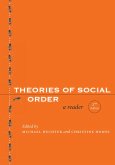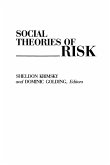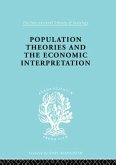- Broschiertes Buch
- Merkliste
- Auf die Merkliste
- Bewerten Bewerten
- Teilen
- Produkt teilen
- Produkterinnerung
- Produkterinnerung
"This is exactly what we need for contemporary theory courses. Hancock and Garner brilliantly dissect the four most eminent theorists who will continue to define the future of sociological theory well into the twenty-first century." - Ron Mize, Cornell University
Andere Kunden interessierten sich auch für
![Social Theories of Talcott Parsons Social Theories of Talcott Parsons]() Max BlackSocial Theories of Talcott Parsons27,99 €
Max BlackSocial Theories of Talcott Parsons27,99 €![Advancing Family Theories Advancing Family Theories]() James M. WhiteAdvancing Family Theories159,99 €
James M. WhiteAdvancing Family Theories159,99 €![The Social Theories of Talcott Parsons The Social Theories of Talcott Parsons]() Max BlackThe Social Theories of Talcott Parsons27,99 €
Max BlackThe Social Theories of Talcott Parsons27,99 €![Theories of Social Order Theories of Social Order]() Theories of Social Order39,99 €
Theories of Social Order39,99 €![Social Theories of Risk Social Theories of Risk]() Social Theories of Risk62,99 €
Social Theories of Risk62,99 €![Theories of Industrial Society (RLE Social Theory) Theories of Industrial Society (RLE Social Theory)]() Richard BadhamTheories of Industrial Society (RLE Social Theory)68,99 €
Richard BadhamTheories of Industrial Society (RLE Social Theory)68,99 €![Population Theories and their Economic Interpretation Population Theories and their Economic Interpretation]() Sydney H. CoontzPopulation Theories and their Economic Interpretation68,99 €
Sydney H. CoontzPopulation Theories and their Economic Interpretation68,99 €-
-
-
"This is exactly what we need for contemporary theory courses. Hancock and Garner brilliantly dissect the four most eminent theorists who will continue to define the future of sociological theory well into the twenty-first century." - Ron Mize, Cornell University
Hinweis: Dieser Artikel kann nur an eine deutsche Lieferadresse ausgeliefert werden.
Hinweis: Dieser Artikel kann nur an eine deutsche Lieferadresse ausgeliefert werden.
Produktdetails
- Produktdetails
- Verlag: University of Toronto Press
- Seitenzahl: 256
- Erscheinungstermin: 1. März 2009
- Englisch
- Abmessung: 226mm x 152mm x 15mm
- Gewicht: 340g
- ISBN-13: 9780802096821
- ISBN-10: 0802096824
- Artikelnr.: 26015570
- Herstellerkennzeichnung
- Libri GmbH
- Europaallee 1
- 36244 Bad Hersfeld
- gpsr@libri.de
- Verlag: University of Toronto Press
- Seitenzahl: 256
- Erscheinungstermin: 1. März 2009
- Englisch
- Abmessung: 226mm x 152mm x 15mm
- Gewicht: 340g
- ISBN-13: 9780802096821
- ISBN-10: 0802096824
- Artikelnr.: 26015570
- Herstellerkennzeichnung
- Libri GmbH
- Europaallee 1
- 36244 Bad Hersfeld
- gpsr@libri.de
By Black Hawk Hancock and Roberta Garner
Preface
Introduction: What is Theory and Why Does it Change?
Periods of Social Theory
The Organization of the Book
Part I: Changes
Chapter 1: 1968-2009: What Happened?
Why 1968?
A New Global Order: Globalization, Neoliberalism and Market Expansion, and
Hyper-Industrialization
Issues without Borders: Population Growth, Urbanization, Health and
Environmental Problems, and Regional Conflicts
The Emerging Distribution of Economic Inequality
Cultural Consequences: Postmodern Culture and Ironic Hopelessness
How and Why Did All These Changes Happen?
Conclusion
Chapter 2: Changes in Theory
Introduction: Making Theories
How and Why Have Sociological Theories Changed in the Past Forty Years?
Toward Contemporary Theories
Conclusion
Part II: Transitional Giants
Chapter 3: Erving Goffman (1922-1982)
Major Works, Ideas, and Concepts
Total Institutions and Labels
Interaction Order and Behavior
Frames of Reference and Discourse
The Politics and Feeling-Tone of Goffman's Work
Rupture and Continuity: Goffman as a Transitional Giant and Postmodernist
Chapter 4: Michel Foucault (1926-1984)
Major Works, Ideas, and Concepts
Foucault and the Traditions of Social Theory
Foucault's Impact and Method
Foucault's Politics
Conclusion: Foucault and the Transition to Contemporary Theory
Chapter 5: Pierre Bourdieu (1930-2002)
The Craft of Sociology
Habitus, Body, Practice
Symbolic Power, Symbolic Violence, and Misrecognition
Fields, Spaces, and Capitals
Taste, Distinction, and Naturalized Categories
Public Intellectuals and Politics
The Critique of Neoliberalism
Conclusion: A Note on Foucault and Bourdieu
Chapter 6: Stuart Hall (1932- )
Hegemony
Ideology
Articulation
Overdetermination
False Consciousness
The Function of Common Sense
Interpellation and Ideological Subjects
Hegemony, Ideology, and Societies Structured in Dominance
Race: The Floating Signifier
Media: The Politics of Representation
Critical Politics of Contesting Images
Culture as the Arena of Struggle
Identity
The Move to Ethnicity
Thinking about Multiculturalism
Intellectual Labor and Politics of Resistance
Conclusion
Conclusion
The Uneven Impact of Contemporary Theory on Sociology
Legacies, Reinterpretations, and New Paradigms
Beyond Legacies: What's New?
What Will Happen Next?
References and Suggestions for Further Reading
Note to Readers
General Theoretical References (with Jose Soltero)
References and Reading Suggestions for the Transitional Giants
Erving Goffman
Michel Foucault
Pierre Bourdieu
Stuart Hall
Two Specialized Areas: References and Reading Suggestions
Theoretical Development in the Sociology of Families (prepared by Tait
Runnfeldt Medina and Julie Artis)
Sociology of Health (prepared by Grace Budrys)
Index
Introduction: What is Theory and Why Does it Change?
Periods of Social Theory
The Organization of the Book
Part I: Changes
Chapter 1: 1968-2009: What Happened?
Why 1968?
A New Global Order: Globalization, Neoliberalism and Market Expansion, and
Hyper-Industrialization
Issues without Borders: Population Growth, Urbanization, Health and
Environmental Problems, and Regional Conflicts
The Emerging Distribution of Economic Inequality
Cultural Consequences: Postmodern Culture and Ironic Hopelessness
How and Why Did All These Changes Happen?
Conclusion
Chapter 2: Changes in Theory
Introduction: Making Theories
How and Why Have Sociological Theories Changed in the Past Forty Years?
Toward Contemporary Theories
Conclusion
Part II: Transitional Giants
Chapter 3: Erving Goffman (1922-1982)
Major Works, Ideas, and Concepts
Total Institutions and Labels
Interaction Order and Behavior
Frames of Reference and Discourse
The Politics and Feeling-Tone of Goffman's Work
Rupture and Continuity: Goffman as a Transitional Giant and Postmodernist
Chapter 4: Michel Foucault (1926-1984)
Major Works, Ideas, and Concepts
Foucault and the Traditions of Social Theory
Foucault's Impact and Method
Foucault's Politics
Conclusion: Foucault and the Transition to Contemporary Theory
Chapter 5: Pierre Bourdieu (1930-2002)
The Craft of Sociology
Habitus, Body, Practice
Symbolic Power, Symbolic Violence, and Misrecognition
Fields, Spaces, and Capitals
Taste, Distinction, and Naturalized Categories
Public Intellectuals and Politics
The Critique of Neoliberalism
Conclusion: A Note on Foucault and Bourdieu
Chapter 6: Stuart Hall (1932- )
Hegemony
Ideology
Articulation
Overdetermination
False Consciousness
The Function of Common Sense
Interpellation and Ideological Subjects
Hegemony, Ideology, and Societies Structured in Dominance
Race: The Floating Signifier
Media: The Politics of Representation
Critical Politics of Contesting Images
Culture as the Arena of Struggle
Identity
The Move to Ethnicity
Thinking about Multiculturalism
Intellectual Labor and Politics of Resistance
Conclusion
Conclusion
The Uneven Impact of Contemporary Theory on Sociology
Legacies, Reinterpretations, and New Paradigms
Beyond Legacies: What's New?
What Will Happen Next?
References and Suggestions for Further Reading
Note to Readers
General Theoretical References (with Jose Soltero)
References and Reading Suggestions for the Transitional Giants
Erving Goffman
Michel Foucault
Pierre Bourdieu
Stuart Hall
Two Specialized Areas: References and Reading Suggestions
Theoretical Development in the Sociology of Families (prepared by Tait
Runnfeldt Medina and Julie Artis)
Sociology of Health (prepared by Grace Budrys)
Index
Preface
Introduction: What is Theory and Why Does it Change?
Periods of Social Theory
The Organization of the Book
Part I: Changes
Chapter 1: 1968-2009: What Happened?
Why 1968?
A New Global Order: Globalization, Neoliberalism and Market Expansion, and
Hyper-Industrialization
Issues without Borders: Population Growth, Urbanization, Health and
Environmental Problems, and Regional Conflicts
The Emerging Distribution of Economic Inequality
Cultural Consequences: Postmodern Culture and Ironic Hopelessness
How and Why Did All These Changes Happen?
Conclusion
Chapter 2: Changes in Theory
Introduction: Making Theories
How and Why Have Sociological Theories Changed in the Past Forty Years?
Toward Contemporary Theories
Conclusion
Part II: Transitional Giants
Chapter 3: Erving Goffman (1922-1982)
Major Works, Ideas, and Concepts
Total Institutions and Labels
Interaction Order and Behavior
Frames of Reference and Discourse
The Politics and Feeling-Tone of Goffman's Work
Rupture and Continuity: Goffman as a Transitional Giant and Postmodernist
Chapter 4: Michel Foucault (1926-1984)
Major Works, Ideas, and Concepts
Foucault and the Traditions of Social Theory
Foucault's Impact and Method
Foucault's Politics
Conclusion: Foucault and the Transition to Contemporary Theory
Chapter 5: Pierre Bourdieu (1930-2002)
The Craft of Sociology
Habitus, Body, Practice
Symbolic Power, Symbolic Violence, and Misrecognition
Fields, Spaces, and Capitals
Taste, Distinction, and Naturalized Categories
Public Intellectuals and Politics
The Critique of Neoliberalism
Conclusion: A Note on Foucault and Bourdieu
Chapter 6: Stuart Hall (1932- )
Hegemony
Ideology
Articulation
Overdetermination
False Consciousness
The Function of Common Sense
Interpellation and Ideological Subjects
Hegemony, Ideology, and Societies Structured in Dominance
Race: The Floating Signifier
Media: The Politics of Representation
Critical Politics of Contesting Images
Culture as the Arena of Struggle
Identity
The Move to Ethnicity
Thinking about Multiculturalism
Intellectual Labor and Politics of Resistance
Conclusion
Conclusion
The Uneven Impact of Contemporary Theory on Sociology
Legacies, Reinterpretations, and New Paradigms
Beyond Legacies: What's New?
What Will Happen Next?
References and Suggestions for Further Reading
Note to Readers
General Theoretical References (with Jose Soltero)
References and Reading Suggestions for the Transitional Giants
Erving Goffman
Michel Foucault
Pierre Bourdieu
Stuart Hall
Two Specialized Areas: References and Reading Suggestions
Theoretical Development in the Sociology of Families (prepared by Tait
Runnfeldt Medina and Julie Artis)
Sociology of Health (prepared by Grace Budrys)
Index
Introduction: What is Theory and Why Does it Change?
Periods of Social Theory
The Organization of the Book
Part I: Changes
Chapter 1: 1968-2009: What Happened?
Why 1968?
A New Global Order: Globalization, Neoliberalism and Market Expansion, and
Hyper-Industrialization
Issues without Borders: Population Growth, Urbanization, Health and
Environmental Problems, and Regional Conflicts
The Emerging Distribution of Economic Inequality
Cultural Consequences: Postmodern Culture and Ironic Hopelessness
How and Why Did All These Changes Happen?
Conclusion
Chapter 2: Changes in Theory
Introduction: Making Theories
How and Why Have Sociological Theories Changed in the Past Forty Years?
Toward Contemporary Theories
Conclusion
Part II: Transitional Giants
Chapter 3: Erving Goffman (1922-1982)
Major Works, Ideas, and Concepts
Total Institutions and Labels
Interaction Order and Behavior
Frames of Reference and Discourse
The Politics and Feeling-Tone of Goffman's Work
Rupture and Continuity: Goffman as a Transitional Giant and Postmodernist
Chapter 4: Michel Foucault (1926-1984)
Major Works, Ideas, and Concepts
Foucault and the Traditions of Social Theory
Foucault's Impact and Method
Foucault's Politics
Conclusion: Foucault and the Transition to Contemporary Theory
Chapter 5: Pierre Bourdieu (1930-2002)
The Craft of Sociology
Habitus, Body, Practice
Symbolic Power, Symbolic Violence, and Misrecognition
Fields, Spaces, and Capitals
Taste, Distinction, and Naturalized Categories
Public Intellectuals and Politics
The Critique of Neoliberalism
Conclusion: A Note on Foucault and Bourdieu
Chapter 6: Stuart Hall (1932- )
Hegemony
Ideology
Articulation
Overdetermination
False Consciousness
The Function of Common Sense
Interpellation and Ideological Subjects
Hegemony, Ideology, and Societies Structured in Dominance
Race: The Floating Signifier
Media: The Politics of Representation
Critical Politics of Contesting Images
Culture as the Arena of Struggle
Identity
The Move to Ethnicity
Thinking about Multiculturalism
Intellectual Labor and Politics of Resistance
Conclusion
Conclusion
The Uneven Impact of Contemporary Theory on Sociology
Legacies, Reinterpretations, and New Paradigms
Beyond Legacies: What's New?
What Will Happen Next?
References and Suggestions for Further Reading
Note to Readers
General Theoretical References (with Jose Soltero)
References and Reading Suggestions for the Transitional Giants
Erving Goffman
Michel Foucault
Pierre Bourdieu
Stuart Hall
Two Specialized Areas: References and Reading Suggestions
Theoretical Development in the Sociology of Families (prepared by Tait
Runnfeldt Medina and Julie Artis)
Sociology of Health (prepared by Grace Budrys)
Index








